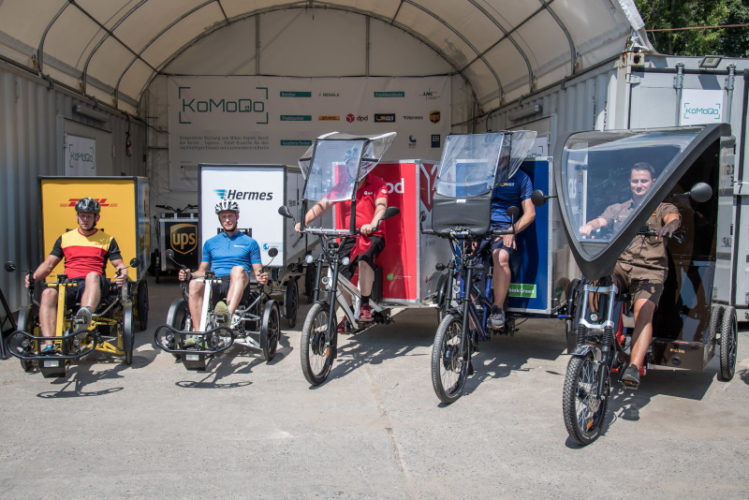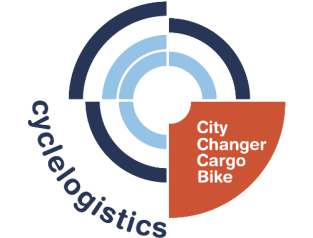
Cargobikes sind Teil der gestern in Brüssel vorgestellten Mobilitätsstrategie der EU-Kommission. Ein politischer Erfolg für die Radlogistik-Branche!
Die vom Vizepräsidenten der EU-Kommission Frans Timmermans vorgestellte 25 Seiten lange EU-Mobilitätsstrategie ist Teil des European Green Deal, der die EU bis 2050 klimaneutral machen soll.
Cargobikes kommen im Abschnitt Greening Fright Transport auf Seite 11 vor:
The growth of e-ommerce has significantly changed consumption patterns, but the external costs of millions of deliveries, including the reduction of empty and unnecessary runs, must be factored in. Hence, sustainable urban mobility planning should also include the freight dimension through dedicated sustainable urban logistics plans. These plans will accelerate the deployment of zero-emission solutions already available, including cargo bikes, automated deliveries and drones (unmanned aircraft) and better use of inland waterways into cities.
Auf der Pressekonferenz zur Vorstellung der Mobilitätsstretegie sagte Timmermans laut Pressemitteilung der europäischen Fahrradverbände ECF, Conebi und CIE:
Cars will be less dominant on our streets. Alliances with cities and regions will offer clean public transport and 5000 km extra bike lanes. One lesson we can draw from the horrible Covid crisis, in cities with plenty of bike lanes, citizens could keep moving.
Die Verbände begrüßen in ihrem Statement das deutliche Bekenntnis zur Radverkehrsförderung in der Mobilitätastrategie, merken jedoch kritisch an:
that the strategy does not yet set specific milestones for cycling as a transport mode in the transport system of the future, nor does it incorporate specific, explicit actions to increase cycling uptake in its action plan.
Wie wäre es zum Beispiel mit einer europaweite Kaufprämien-Überblick anstatt nationaler Kaufprämien für E-Autos? Und 50.000 Städte mit Cargobike Sharing in ganz Europa? Das wäre zumindest ein Anfang!
Greenpeace kommentiert die EU-Mobilitätsstrategie insgesamt als vollkommen unzureichend, weil keine Reduktionsziele für den Auto- und Flugverkehr vorgesehen sind:
Greenpeace EU climate campaigner Lorelei Limousin said: “Supporting a few green measures can never balance out letting some of Europe’s biggest emitters off the hook. While the European Commission pledges to boost rail and sustainable mobility, it failed once again to cut off the flow of taxpayer money to dirty industries.”
The Commission’s proposal does not suggest setting a reduction target for air travel, nor the number of privately owned cars. While it does suggest that “collective travel” (e.g. via air, rail and bus) under 500 km in the EU be carbon neutral by 2030, it nevertheless falls short of binding measures, such as a ban on short-haul flights where there is a greener alternative like rail. It also fails to set an end date for the sale of new cars with internal combustion engines.
Auch wenn die Erwähnung von Cargobikes für die urbane Logistik in der EU-Mobilitätsstrategie ein großer politischer Erfolg für die Radlogistik-Branche ist: Eine europäische Verkehrswende braucht deutlich mehr!
Hintergrund
- Auf europäischer Ebene setzt sich die European Cycle Logistics Federation (ECLF) für mehr urbane Logistik mit Cargobikes ein. Deutsche Sektion der ECLF ist der Radlogistik Verband Deutschland e.V. (RLVD)
- Das EU geförderte Projekt CityChangerCargoBike setzt sich mit einem Partnernetztwerk aus zahlreichen Städten, ECLF, Cycling Industries Europe und cargobike.jetzt durch zahlreiche Projekte dafür ein, die private und gewerbliche Nutzung von Cargobikes in Europa zu fördern.

Dieser Beitrag entstand mit freundlicher Unterstützung des Projektes CityChangerCargoBike. Das Projekt wurde mit Mitteln aus dem Forschungs- und Innovationsprogramm Horizon 2020 der Europäischen Union unter der Fördervereinbarung Nr. 769086 finanziert.
